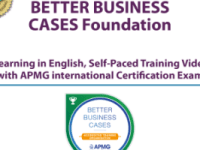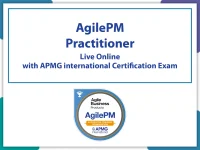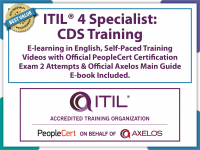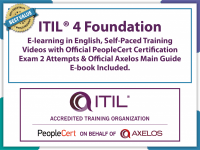Become an agile project leader with in-depth knowledge of agile principles.
Agile, Project Management
What is required?
- AgilePM Foundation certificate.
Who is the Practitioner level for?
- AgilePM Foundation Certified Professionals.
- Agile team members who want to become Agile Project Managers.
Course Summary
As the AgilePM Practitioner certification is for those who have passed the Foundation exam, it’s objective is to transition learners from understanding the framework to applying it effectively. It is designed for professionals in project focused environments who want to be agile.
What are the key things that you will learn?
- How to apply a variety of agile practices to a project, for example, workshops, the MoSCoW technique to define project priorities, iterative development and modeling.
- How to test, estimate and evaluate profit delivery in an Agile project.
- Facilitation and support mechanisms within an Agile project.
- The agile approach to manage and prioritize requirements.
Course Structure
The standard agenda for an AgilePM Practitioner course includes:
- Roles and Responsibilities – the Project Managers view
- Agile Project Management – through the lifecycle
- The Effective Use of the Products
- Deliver on time – Combining MoSCoW Prioritization and Timeboxing
- People, Teams and Interactions
- Requirements and User Stories
- Estimating – How and When
- Project Planning through the Lifecycle
- Quality – Never Compromise Quality
- Risk management
- Tailoring the approach.
Exam Format:
- Objective testing examination. 4 questions (20 points per question).
- 40/80 points required to pass the exam (50%).
- Duration 2.5 hours.
- Open book (only the official AgilePM manual is allowed).
Since its introduction in 2010, AgilePM has fast established itself as the world’s leading framework and certification for Agile project management, with over 200,000 exams sat worldwide.
The AgilePM qualification is based on the AgilePM Handbook, published by the Agile Business Consortium.
The Handbook offers a practical and repeatable methodology that achieves an ideal balance between the standards, rigour and visibility required for good project management, and the fast-pace, change and empowerment provided by Agile.
Agile Project Management training and certification help individuals to:
- Apply the underpinning philosophy and principles of AgilePM in a project situation
- Appropriately configure the lifecycle of an Agile project to a given scenario
- Identify and apply popular Agile techniques in a project situation, including MoSCoW prioritisation, iterative development and timeboxing
- Understand and assign roles and responsibilities within an Agile project
- Understand the mechanisms for governance and control of an Agile project
- Understand how to test, estimate and measure progress in an Agile project
- Describe and apply the Agile approach to managing requirements.






